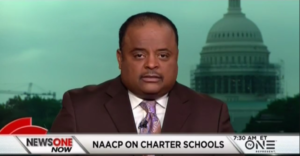
Washington-based TV host Roland Martin hosted a debate on the NAACP's stance against charter schools.
Yesterday, on a morning news broadcast in the nation's capital, host Roland Martin asked the question: "Is the NAACP out of step with black folks?"
He was grilling Hilary Shelton, the director of the NAACP's Washington bureau, about the national civil rights organization's latest stand against school choice.
In mid-July, the organization's members approved a resolution that called for restricting the growth of charter schools. They've passed resolutions critical of charters before, but the new one, which recently started making the rounds on blogs critical of education reform, goes further. It calls for an outright moratorium "on the proliferation of privately managed charter schools."
The ensuing controversy mirrors recent events in Florida, where educators and black clergy members who support the NAACP have taken issue with its role in a lawsuit challenging a private school choice program* for low-income children.
Martin, a prominent journalist at the black-owned D.C. outlet News One, is an unabashed supporter of school choice who speaks at charter school conferences and spars with critics on his Twitter feed. He told Shelton that surveys show African-Americans are more likely to support charters. He wanted to know whether NAACP leaders would get more input before they meet in the fall, when the resolution could become official policy for the organization.
"Are you going to bring in black folks who run charter schools to get their perspective?" he asked, adding: "I can give you a list."
The discussion on Martin's program grew heated. Steve Perry, the founder of Capital Preparatory charter schools, accused the NAACP of acting on behalf of teachers unions, which have donated thousands of dollars to the group.
Shelton, the D.C. NAACP leader, countered that Perry made his living from charter schools, which he argued have become "tools to maintain segregation," particularly in the South.
He said any member of the organization in good standing can propose a resolution. Thousands of members supported the charter school moratorium, he added, citing a litany of issues from discipline disparities to taxpayer money that went missing.
"The bottom line is that it's not limited to just one or two states," he said. "With a moratorium, all we're saying is, let's take a good look. Before we set up another charter school, let's make sure that everything is in place, and the kind of discrimination that we've been experiencing is not something that carries forward."
Shavar Jeffries, the president of Democrats for Education Reform, tried to defuse the exchange between Perry and Shelton. Thousands of families sit on charter school waiting lists, Jeffries said, and a study of urban charters by the Center for Research on Education Outcomes found that black students were among the groups most likely to see bigger academic gains after enrolling in charters.
"Overall, public charter schools throughout this country are doing tremendous work for our young people, particularly our young children of color, and we absolutely need everyone who cares about kids of color to support those schools that are doing a great job for our babies," he said.
*Step Up For Students, which publishes this blog, helps administer Florida's tax credit scholarship program.